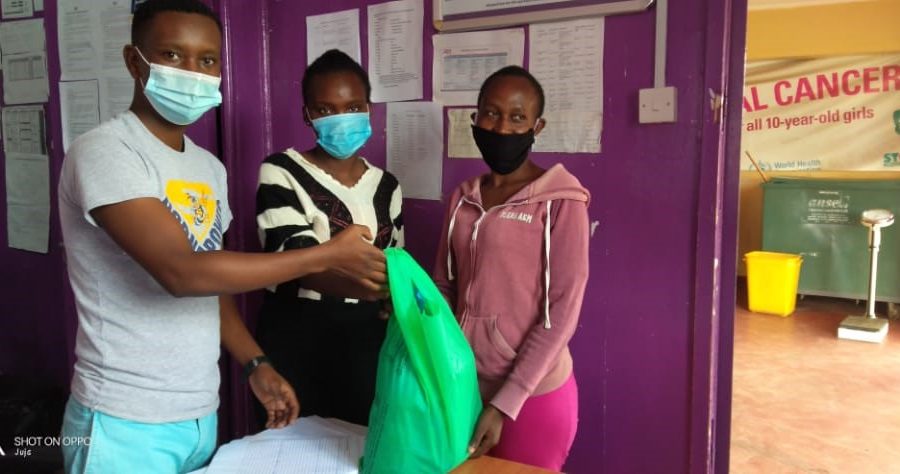How the HIV response is adapting in the face of COVID-19
 © LVCT
© LVCT
All over the world, community-based organisations are initiating innovations in HIV services to continue reaching people with what they need most, be it medicine, food, psychosocial support or emergency accommodation.
When COVID-19 and lockdown struck Kenya, Frontline AIDS’ partner LVCT Health quickly arranged for all their service users living with HIV to be given a three-month stock of antiretroviral treatment.
Multi-month supplies of condoms and pre-exposure prophylaxis (PrEP) were given to clients needing HIV prevention services. Peer support groups were moved online and treatment adherence support was transferred to SMS, WhatsApp and a toll-free helpline.
In India, the Mizoram Drug Users’ Forum successfully lobbied the government to allow prescription of take-home methadone, and to allow new users to register for opioid substitution therapy, a service that had been cut back or stopped because of the pressure that COVID-19 had put on the health system.
When travel restrictions were introduced across Ecuador, community-based organisation Kimirina rapidly expanded their telemedicine service by which people can get a doctors’ appointment via Zoom, at no cost to the client. The service users, most of whom are men who have sex with men, are contacted by community outreach workers who have been active in the communities over many years and are a trusted source of support and information.
Obstacles to health and wellbeing are magnified by COVID-19
These examples, from our new report Transforming the HIV response, highlight a few of the innovations that Frontline AIDS partners have introduced to safeguard services for marginalised people during the COVID-19 pandemic. They have stepped in where governments have failed to support or, worse, where authorities have used the exceptional circumstances to clamp down on people already stigmatised and discriminated against.
Marginalised people living with or at risk of acquiring HIV face significant barriers to health and wellness at the best of times. These barriers have only been exacerbated by the COVID-19 pandemic and the measures instigated to mitigate it. We are deeply concerned to see that:
- People are struggling to meet their basic needs. No longer able to earn an income they cannot access essentials including food, water and shelter and have become increasingly dependent on government or community services, where these are available. Some health services are inaccessible. There are widespread reports of antiretroviral treatment shortages and disruptions to the supply of contraception, as well as interruptions to tuberculosis testing and treatment.
- People fear for their own safety and security. This includes lesbian, gay, bisexual and transgender (LGBT) people fearing being outed, arrested, physically harmed or discriminated against by public service providers. As a result, people are not seeking out government-provided food parcels, other provisions or health services, where these are available.
- Government services are not being provided equitably. There are reports that criminalised groups – including sex workers and LGBT people – are being denied access or excluded from emergency and humanitarian responses to COVID-19. Equally, people who use drugs are finding opioid substitution treatment and other harm reduction services have stopped or have been deprioritised.
- Organisations closest to communities are under threat. This is a result of low capacity and resources and restrictions on their movements at the same time as increased demand for their services. Civic space is shrinking, with dissenting voices silenced and anyone calling for alternative approaches condemned. This makes it dangerous for civil society to serve the communities they represent, including those most at risk of and living with HIV.
- Human rights violations have increased. New threats to human rights are emerging. Some people who are locked down with, and increasingly economically dependent on, their abuser(s) are unable to access support. LGBT people are among those confined to their homes where they may face violence. Governments are sanctioning the use of laws and restrictions, ostensibly put in place to stop the spread of COVID-19, to oppress, harass and abuse marginalised groups.
Communities best placed to find solutions
From the very beginning of the COVID-19 outbreak, Frontline AIDS partners have stepped forward to respond to these challenges. With decades on the frontline of the HIV response, they have a wealth of experience when it comes to tackling a global health emergency and are now using their knowledge, networks and skills to adapt and innovate.
Community-based organisations know their communities better than anyone and are trusted to support them. These organisations have developed their own differentiated services designed to meet the varied needs of people and have pushed for other service providers to do the same. Now, during this COVID-19 emergency, they are best placed to understand the challenges that communities face and to help find solutions.
As our report shows, communities are tackling this pandemic in inspirational ways that show their experience, skill, adaptability and responsiveness. The wider world would do well to learn from them and to follow their lead.
Tags
COVID-19Harm reductionHIV preventionPeople who use drugsRapid Response FundSex workSexual and reproductive health and rights (SRHR)

